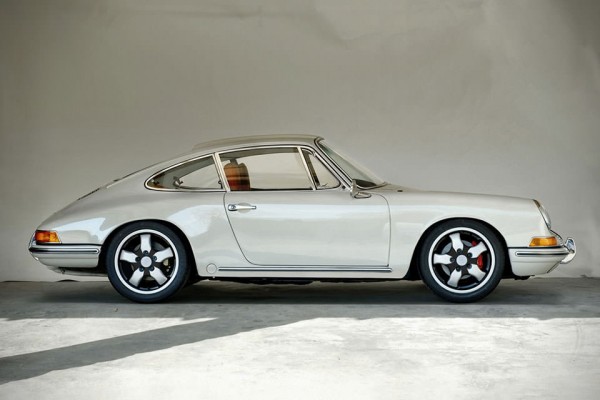Gavin Rooke’s Porsche 912 located in his hometown of Johannesburg, South Africa is custom built with over 50 years Porsche-only components that manage to wrap up a classic 912 1968 body.
The 1974 2.7-liter Porsche motor features a custom-flowed engine casing, resized barrels, aluminum racing pistons, and modified camshafts. It delivers 240 hp and gets to 62 mph in six seconds. Inside you’ll find leather piping on 1989 Porsche tombstone seats, ivory-accented double-stitching, and a punched leather dashboard. The fully rebuilt 1974 Porsche suspension replaces the original short-wheel base suspension for improved handling. The 2004 Four-Pot Porsche disc brakes give you that modern-day stopping power we all prefer, and the 2013 911 headlamp units are encased within the original 1968 lenses for classic styling with modern performance.
Do note this though: In the 1960s, when Porsche launched the first 911 model, the factory supplied “Factory Rally Kits” which included anti-roll bars, racing brake pads and a dead pedal rest as optional extras. Gavin decided to produce a contemporary version of a 1968 Porsche 912 “Weekend Racer”. And so he embarked on a full rebuild of the classic Porsche 912, integrating old and new into a final package. And then he entered into the Kalahari Speedweek, close to Namibia and topped 190km/h.
“I learned to restore cars from an early age and I have significant appreciation for people who work with their hands”, says Gavin Rooke.
Gavin, of course, is the Founder and CEO of the Dutchmann Guild. “We connect master craftsmen with contemporary designers and artists, creating collaborations that fuse craft-based practices with progressive ideas. The guild creates beautifully engineered products, with an incredible amount of attention to detail, for people who appreciate the craft, by people who appreciate the craft”, he explains.
The objective was to develop unique collaborations that would highlight the high level of quality craftsmen they have in South Africa. And now, the aesthetic impact of anything touched by the Guild is huge. Classic, yet contemporary. Striking, but subtle. And as for the name… “Dutchmann” comes from the term ‘Dutchman’ often derogatorily applied in the past to blue-collar South African artisans, and refers to the Dutch-settler ancestral roots of various South African families. Ironic. They just wanted to take that relatively negative perception and flip it to represent a magical almost “guild” of craftspeople.
[All images are courtesy of Gavin Rooke.]
